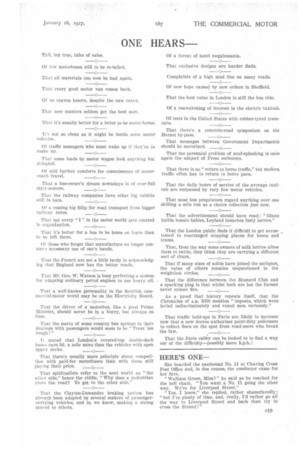ONE HEARS
Page 41

If you've noticed an error in this article please click here to report it so we can fix it.
Tall, hut true, tales of sales.
Of few motorbuses still to be re-tailed.
That all materials Can now be had again.
That every good motor van comes back.
Of no craven hearts, despite the new taxes.
That new masters seldom get the best men.
That it's usually better for a letter to be motor-borne.
It's not so clean as it might be inside some motor vel)ieles.
Of traffic managers who must wake up if they're to make up. 0 That some loads by motor wagon look anything but shingled. -0 Of still further comforts for connoisseurs of motorcoach travel.
That a bus-owner's dream nowadays is of ever-full sixty-seaters. 0 That the railway companies have Other big rabbits still in hats. 0 Of a coming big fillip for road transport from bigger railway rates. 0 That not every " I " in the motor world gets centred in organization.
That it's better for a bus to be home on leave than to be left there. 0 Of those who forget that manufacture no longer connotes necessary use of one's hands.
That the French are not a little tardy in acknowledging that England now has the better roads.
That Mr: Geo. W. Watson is busy perfecting a system for adapting ordinary petrol engines to use heavy oil.
That a well-known personality in the Scottish commercial-motor world may be on the Electricity Board.
That the driver of a" motorbus, like a good Prime Minister, should never be in a hurry, but always on time. 0 That the motto of some country bus springs in their dealings with passengers would seem to be "Trent 'em rough. !" 0 It stated that London's covered-top double-deck buses earn 34. a mile more than the vehicles with open upper decks. .
That there's usually more principle about competition with paid-for motorbuses than with those still paying their price. 0 .
That spiritualists refer to the next world as "the other side," hence the riddle; "Why does a pedestrian cross the road? To get to the other side."
That the Clayton-Dewandre braking system has already been adopted by several makers of passengerca rrying vehicles, and is, we know, making a strong appeal to others. Of a threat of hotel megalomania.
That exclusive designs are harder finds.
Complaints of a high mud line on many roads. Of new hope caused by new orders in Sheffield. That the best value in London is still the bus ride. Of a reawakening of interest in the electric taxicab.
Of tests in the United States with rubber-tyred tram cars. 0 That there's a _concrete-road symposium on the Barnet by-pass. 0 That messages between Government Departments should be motorized.
That the perennial problem of mud-splashing is once again the subject of Press outbursts.
That there is no "return to horse traffic," but modern traffic often has to return to horse pace.
That the daily hours of service of the average taxicab are surpassed by very few motor vehicles.
That most bus proprietors regard anything over one shilling a mile run as a choice collection just now.
That the advertisement should have read: "Glaxo builds bonnie babies, Leyland launches lusty lorries."
That the London public finds it difficult to get accustomed to rearranged stopping places for buses and trains. 0 That, from the way some owners of milk lorries allow them to rattle, they think they are carrying a different sort of churn.
That if many sizes of solids have joined the antiques, the value of others remains unquestioned in the weightiest circles.
. That the difference between the Mustard Club and a sparking plug is that whilst both are hot the former never misses fire. 0 As a proof that history repeats itself, that the Chronicles of A.D. 1050 mention "imposts, which were levied indiscriminately and vexed men variously."
That traffic hold-ups in Paris are likely to increase now that a new decree authorizes point-duty policemen to collect fines on the spot from road-users who break the law. 0 That the Paris cabby can be looked to to find a way out of the difficulty—possibly more k.p.h.?












































































































